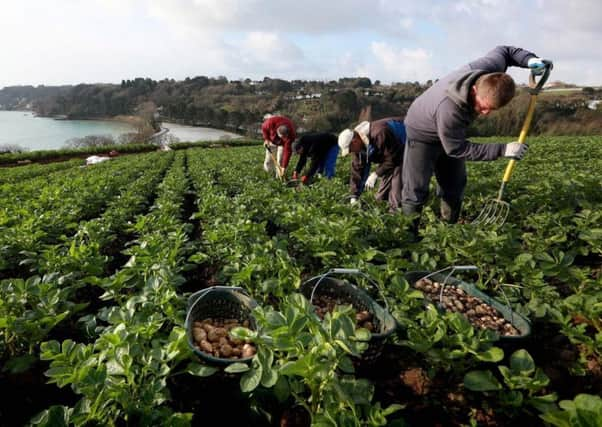Fruit and veg growers warn new migrant labour scheme will have little impact


Under a new pilot scheme, 2,500 workers aged 18 and over from non-EU countries will be eligible to apply for six-month visas to work on British fruit and vegetable farms.
The “tightly controlled” scheme will run for two years, starting next spring and continuing through to the end of 2020.
Advertisement
Hide AdAdvertisement
Hide AdNick Marston, chairman of British Summer Fruits, said the scheme will not go far enough for a sector that employ 60,000 seasonal staff from the EU annually, with berries alone accounting for 29,000 workers.
“Our farms are reporting staff shortages of 10 to 20 per cent already, and to have any effect in terms of supporting our successful industry, around 10,000 are needed now, not 2,500. This number will have little effect on the current shortages UK farms are facing as we speak,” Mr Marston said.
“The proposal represents a four per cent increase in a shrinking workforce, the UK berry industry grows by at least eight per cent per annum and this will not sustain a standstill, let alone growth.”
He added: “Whilst we appreciate the need for government to manage the scheme, we would ask for further clarification on how they see this moving to a sustainable longer-term solution that can provide for the shortage in labour we are already dealing with.”
Advertisement
Hide AdAdvertisement
Hide AdThe president of the Country Land and Business Association (CLA), Tim Breitmeyer, said the pilot scheme must only be a starting point because its scope “only scratches the surface”.
“A much broader solution is needed to address concerns about availability of labour after Brexit across the rural economy, including seasonal agricultural workers but also longer-term professionals and managers in farming and in other crucial countryside businesses such as rural tourism, veterinary services, food processing, construction and leisure,” Mr Breitmeyer said.
Guy Poskitt, who farms in East Yorkshire, said he took encouragement from the announcement, even if he does not think vegetable growers like him stand to benefit much from it.
Mr Poskitt, vice-chairman of the NFU’s horticulture and potatoes board, said: “It’s a toe in the water but it’s a toe in the right direction.
Advertisement
Hide AdAdvertisement
Hide Ad“It’s clear recognition that the Government is wising up to the fact that there are not enough UK workers to harvest our crops.”
Mr Poskitt produces more than 50,000 tonnes of carrots each year, as well as other root vegetables at his farm near Goole.
He said: “For my business, I don’t use a lot of seasonal workers. I have a lot of year-round workers and that’s something the Government needs to look at next.
“I would like to see the total number increase, as well as longer term schemes for businesses like mine, but this is a very positive announcement.”
Advertisement
Hide AdAdvertisement
Hide AdSoft fruit production in the UK has grown by 130 per cent over the last 20 years and the Government said that the pilot scheme is part of efforts to ensure the trend continues.
It said farmers must also look at ways in which technology can cut demands for physical labour on farms, but with automated harvesting technology not yet universally available, the pilot scheme will support farmers in the short term.
Announcing the scheme this week, Home Secretary Sajid Javid said: “British farmers are vital to the UK’s economy and the Government will look to support them in any way we can.
“This pilot will ensure farmers have access to the seasonal labour they need to remain productive and profitable during busy times of the year.
Advertisement
Hide AdAdvertisement
Hide Ad“I am committed to having an immigration system that reduces migration to sustainable levels, supports all industry and ensures we welcome those who benefit Britain.”
Many of Britain’s competitors source seasonal workers to pick fruit and vegetables, and Environment Secretary Michael Gove added: “We have listened to the powerful arguments from farmers about the need for seasonal labour to keep the horticulture industry productive and profitable.”
Mr Gove said that the Government will review the results of the pilot as it looks at how best to support the longer term needs of the industry outside the EU.
Fruit is grown particularly in Kent, Hereford, Worcestershire and Shropshire, and in Perthshire in Scotland, while field vegetables are grown widely across the UK.
Advertisement
Hide AdAdvertisement
Hide AdThe pilot scheme will be run by two operators who will ensure that suitable workers are selected, they reach their place of employment and leave the UK at the end of their visas.
Return rates will be carefully monitored as part of the ongoing evaluation of the pilot, with provisions to close the route if it presents a threat to immigration control.
The scheme’s operators will be licensed by the Gangmasters and Labour Abuse Authority to ensure workers are protected against labour abuses, that farms adhere to relevant legislation, including paying the National Minimum Wage.
Farms will be vetted to ensure that living and working conditions are of a suitable quality before they are accepted onto the scheme.